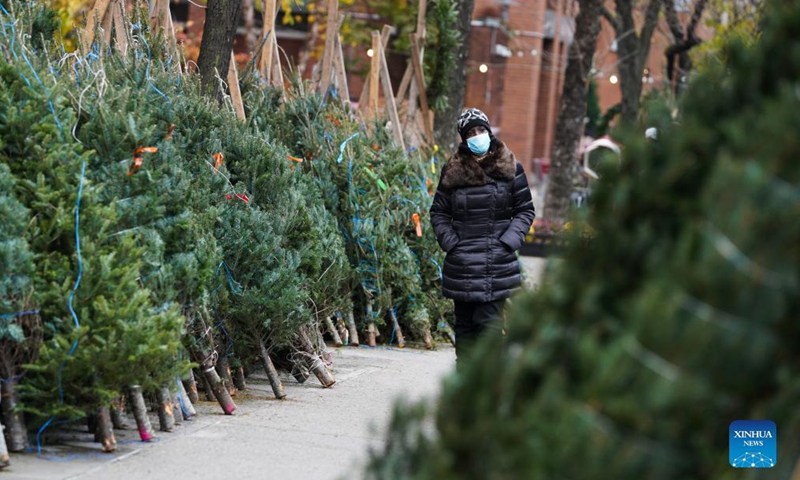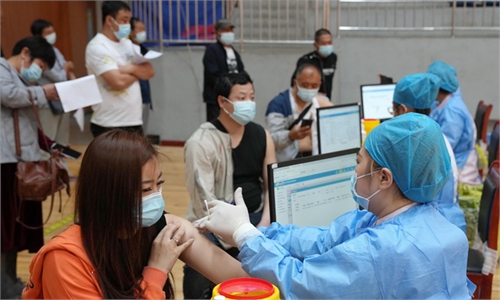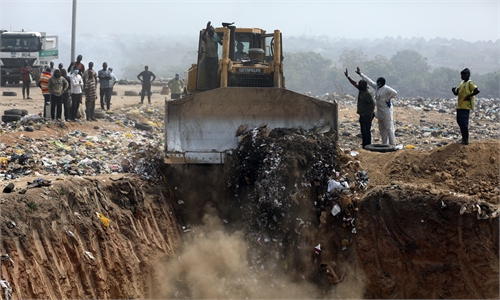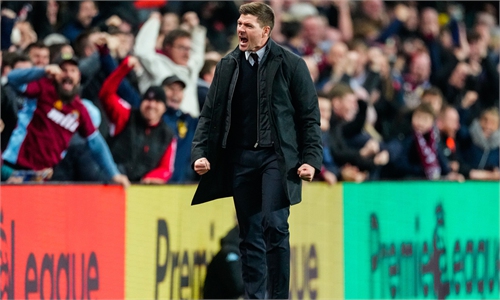Was this the last Christmas with COVID-19?
Epidemiologists remain cautiously optimistic, but surging cases in US may intensify social divergence in 2022

People try ice skating in downtown Shanghai. Photo: VCG

A woman walks through fresh Christmas trees for sale on a street in New York, the United States.Photo:Xinhua
Nurses spent Christmas this year in ICUs in France amid the Omicron surge, while thousands of flights were canceled globally due to the spread of the new variant, keeping many families apart. Many people around the world are tired and frustrated of having to spend another Christmas with COVID-19, but after the WHO forecast that the pandemic will end next year, many have asked the question: Was this the last Christmas under the shadow of COVID-19?
With accelerating vaccination drives and combinations of treatment strategies bringing hope for this year's holiday season compared to 2020, some epidemiologists remained cautiously optimistic, and warned that the public should not completely "drop their guard" given the pandemic could become severe this winter and next spring following increased travel and holiday gatherings.
Some experts predicted that after the holiday season, the US may face a shortage of testing kits as students return to schools and more travels boost testing demand, while a shortage of medical staff due to the surging cases will put more pressure on the public health system. While the US is unlikely to see an eased situation in 2022, the pandemic will continue to intensify bipartisan battling and amplify social divisions, casting a shadow over the midterm elections in November 2022, experts warned.
Another Christmas with COVID
In a Christmas message on Saturday, US President Joe Biden and First Lady Jill Biden honored those grieving loved ones lost during the pandemic, praised the courage and resilience displayed by Americans during the pandemic, and delivered a message of hope and joy. At the same time, US media outlets such as the New York Times and USA Today ran articles about Omicron keeping families apart, as the new variant accounted for 73.2 percent of new COVID-19 infections in the US as of Saturday, and the number of flight cancellations globally for Christmas Eve and Christmas Day came to more than 3,800, according to media reports.
However, compared to 2020, this year's holiday season came along with some hope, the AP reported, as vaccines and other treatments are now more available.
"After two years of fighting the pandemic, many have let their guard down, and some considered it a bigger form of flu," Chen Xi, an assistant professor of public health at Yale University, told the Global Times on Sunday.
Amid the Omicron surge, the US has entered the holiday season with many making plans for travel, and others not having changed their plans for family reunions. However, the country may face two major consequences after the holiday season - a shortage of testing kits and a shortage of medical staff, Chen noted.
The US CDC revised the guidelines, recommending to shorten the recommended isolation time for healthcare workers who have tested positive for COVID-19 from 10 to seven days, a decision also motivated by growing concerns over the possibility that Omicron could worsen staff shortages in hospitals nationwide, CBS News reported on Thursday.
"Testing kits are needed everywhere, from family gatherings and holiday parties to students going back home and back to schools. The testing kit shortage situation may get worse until mid-January," Chen said.
Other countries such as France and Italy faced another gloomy Christmas amid the Omicron threat following flight cancellations and lockdowns. AFP reported on Saturday that this year's Christmas season had been tainted by the pandemic for the second year in a row, and Pope Francis called for more solidarity in an address to 2,000 people all wearing masks.
France reported a record high of 104,611 COVID-19 infections on Saturday, Reuters said, which also broke the 100,000 threshold for the first time since the pandemic began.
Although some epidemiologists remained cautiously optimistic about the situation, others believed that the resurgence of the outbreak in some countries won't change the world's course in heading to the end of the pandemic considering the acceleration of vaccination drives and emergence of special drugs, and more importantly, that the overall death rate is relatively low.
"We are now at a critical phase of enhancing herd immunity," Jin Dongyan, a biomedical professor at the University of Hong Kong, told the Global Times on Sunday.
Data from Europe also shows that the death rate is very low, and in some regions it is almost the same as that of the flu, which means the pandemic is evolving toward the flu, Jin said, noting that we need to further advance mass vaccination while working on Omicron-targeted vaccines.
Resurgence of political virus?
After the WHO stated that "2022 must be the year we end the pandemic," some epidemiologists agreed with this hopeful perspective, as the world will see the end of the pandemic from an epidemiological point of view. However, the social impact could last longer than expected, as the pandemic may have completely changed the way we live, work and interact.
As Omicron coronavirus variant continues to spread across the US, the daily increase in infections in the US has already outpaced that fueled by the Delta variant given that Omicron is spreading faster than expected, more than 69,000 Americans were hospitalized with COVID-19 on Christmas Eve, and the situation may get worse in January, according to CNN.
"I believe the COVID-19 pandemic will continue fueling social conflicts in 2022, amplifying bipartisan battling," Li Haidong, professor at the Institute of International Relations of the China Foreign Affairs University, told the Global Times on Sunday.
Some US media outlets said earlier this month that the pandemic is a factor in Biden's falling approval ratings and the worries facing Democrats over next year's midterm elections, and Democrats and Republicans have already been launching attacks against each other. For example, Democrats criticized the GOP for the public's resistance to masks and vaccines, the Hill said on December 4.
"If the number of infections and death toll continue rising, Republicans will have enough reason to attack Biden and the Democrats, which will only intensify the social divergence in the US," Li said.






